Critical Mass
Is there anyone out there looking forward to a slew of 9.11 movies next year?
Okay, maybe “slew” isn’t quite accurate, but there are at least two solid 9/11 features in the pipeline and there’s a third one trying to finalize a script and get rolling, and they’re all funded by major studios. Plus there’s an ABC-TV miniseries and maybe one or two others looking to commemorate (i.e., cash in on) the 5th anniversary of that nightmare, and all but one is slated to open in mid to late ’06.
And if one of these is truly exceptional, people will naturally want to see it. But how much of an appetite is really there for the idea of tripping back to 9.11 time and time again with a bag of popcorn in your lap?
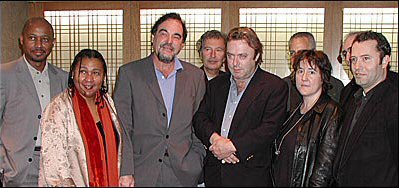
Oliver Stone, Christopher Hitchens, Robert Shaye and others before Alice Tully Hall discussion panel held roughly three weeks after 9/11/01.
Yesterday I asked some friends about the market for these movies and the general mood out there, and their responses are summarized in a story that follows (i.e., the one after the next one). But before you wade into this…
Hasn’t the extensive news and documentary coverage of this nearly four-year-old tragedy already captured the horror and human drama elements pretty thoroughly? What can a movie be expected to bring to the table except to dredge it up all over again with actors and scripted dialogue and CG recreations?
And why are all these 9/11 movies being conceived from the same patriotic and (can I finally say this?) in some ways simple-assed point of view?
< ?php include ('/home/hollyw9/public_html/wired'); ?>
The three tenets of this view are (a) it was an absolutely horrible day, (b) some people responded to the horror with selflessness and amazing heroism, and (c) the Al Qaeda terrorists were motivated solely by the will of Satan, and the U.S. had nothing to do with provoking them in any way, shape or form.
This view is so politically dominant that Oliver Stone, a guy who knows better, not only bailed on trying to make a 9/11 movie that sounds far less rote and much more inquisitive, but agreed to direct what sounds like the biggest mainstream 9.11 sentiment film of them all.
A little over two years ago Stone hired screenwriter John Leone to write a movie about domestic terrorism called Jihad — a thriller that would have depicted the 9/11 horror in the first act but then developed a plot about an attempted nuclear-bombing of Manhattan by a renegade Al Qaeda terrorist.

If there is, as I suspect, limited interest in these films, does this put at least a temporary kibosh on other simmering 9/11 projects? Like, for example, that developing adaptation of 102 Minutes , the best-seller by Jim Dwyer and Kevin Flynn that focuses on the stories of people who were inside the twin towers that day?
Sony-based producer Mike DeLuca hired Shattered Glass director-writer Billy Ray to turn 102 Minutes into a screenplay last March or thereabouts. DeLuca didn’t comment about Ray’s script, but he wrote this morning and said…
“We don’t consider ourselves in a race, and we strongly feel that we are dealing with an as-yet-untold story about the events of that day in New York, a story that only needs to be told the right way…that to put time pressure on something so delicate and sacred would be a blasphemy, and Sony feels the same way.
“To reduce this subject matter to a race between Hollywood movies is wrong-minded and plain wrong to do. This isn’t some summer nonsense about asteroids coming to earth or the like. This all HAPPENED, and it needs to be treated with RESPECT.
“We’re going to make it when it’s right, and the other films have nothing to do with how and when we arrive at [knowing] when it’s right.”
Okay, sure…but DeLuca and Sony are in a game of providing movies that people will want to pay to see, and when you’re the third theatrical 9/11 movie and with people already writing in the press about matters of taste and how soon is too soon and how much is overkill…
I think there’s only one way DeLuca can win this one, if he winds up making this film, and that’s for the first two films to be generally regarded as pretty good but not great, and for DeLuca’s film to be spellbinding. No matter how you look at it, he’s up against it.
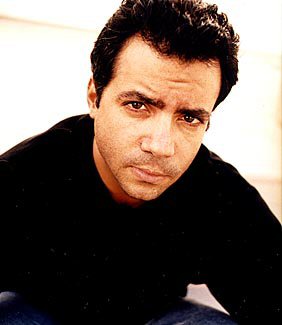
102 Minutes producer Michael Deluca
The two ready-to-go 9/11 features are (a) Oliver Stone and Paramount Pictures’ still-untitled project about the two Port Authority cops who were buried under the rubble of the collapsed World Trade Center towers, and (b) a just-announced feature called Flight 93 for Universal that Paul Greengrass (The Bourne Supremacy, Bloody Sunday) will direct and Working Title’s Tim Bevan and Eric Fellner will produce.
So far Michael Shamberg and Stacy Sher and screenwriter Andrea Berloff are the primary auteurs on the Paramount project. Stone came on as a director-for-hire and is widely presumed to have done so as a career-repair maneuver in the wake of the disastrous reception to Alexander.
Then again, you can bet this film will walk, talk and rumble like any other Oliver Stone film after all is said and done. How can he shoot this thing without delving into the surreal? “Real” was captured by a thousand video cameras that day — a filmmaker worth his salt has no choice but to go someplace else.
The buried-under-rubble project will begin filming in October in New York, and will probably hit screens sometime in late `06.
The Greengrass film is about the hijacked flight that crashed in rural Pennsylvania on 9/11, most likely as a result of passengers overpowering the Al Qaeda hijackers, who intended to slam the jet into a target in Washington, D.C. — either the White House or the Capitol building.
The $15 million film, which will run 90 minutes in “real time” (i.e., the actual time it took the flight to hit Pennsylvania terra firma after takeoff), will begin production on or about October 1st and will wrap before the end of the year. It could be released as early as next summer.
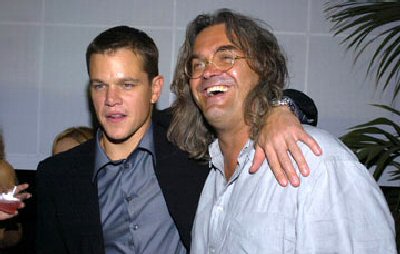
Matt Damon and director Paul Greengrass, apparently (but not necessarily) at the premiere of The Bourne Supremacy, which they both contributed to significantly.
There are three TV projects are in the works, according to Variety, including an ABC miniseries which is starring Harvey Keitel as FBI terrorism expert who was killed in the 9/11 attacks.
And you can bet your bottom dollar than all these projects will wind up saying, in effect, “sad, brave America…a morally decent country attacked by demons..such a godawful day but people were heroes,” etc.
To which anyone would say, yes, yes, it was all that and more, but these impressions have been conveyed over and over in this and that documentary and in tons of books and magazines already.
As one anonymous screenwriter told me on Tuesday, “The 9/11 tragedy has been so overexposed, so written about, so commented upon…but it was five years ago and the national mood has moved so far beyond that.”
In other words, isn’t it time for a bold filmmaker or two to take what happened and move beyond the factual and say something else?
No-Risk Approach
Oliver Stone, one of the few guys out there willing to call a spade a spade, wanted to be that brave filmmaker. Four years ago he had an idea for a drama that would have had 9/11 influences but would have taken things in a more hard-edged, Battle of Algiers-like direction than the rescue movie he’s about to start shooting. But it wasn’t in the cards.
A couple of years ago Stone arranged for a project called Jihad — a thriller about terrorism that used 9/11 merely as a first-act incident — to be written by John Leone (Tough Enough ). Leone is a screenwriter and playwright who’d worked for Stone on a script called Mexico as well one for producer Michael Fitzgerald and Sean Penn.
Leone’s work on Jihad was paid for by Intermedia, the Alexander producers. But then Alexander tanked and Stone’s confidence appeared to weaken. A former associate says, “After Alexander bombed last November, Oliver’s feelings about Jihad were basically, ‘I can’t do this, I’m not going to do this.'”
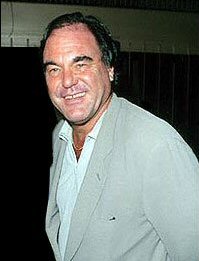
Stone didn’t return a call I made about this on Tuesday, but on top of his acknowledged suffering about the failure of Alexander he most likely concluded he didn’t have the power to push through a provocative 9/11 film in the wake of the biggest tank of his career, particularly in view of…here I am writing this again…Hollywood’s increasing reluctance to finance films with any kind of pointed political content.
Between other fascinating off-the-cuff thoughts he shared during a panel discussion in Manhattan in early October ’01 about Hollywood practices called “Making Movies That Matter: The Role of Film in the National Debate,” Stone outlined the rough idea for Jihad.
“I’d like to do a movie on terrorism,” Stone said to the packed house. “It would be like The Battle of Algiers in which you’d just go in and show how it works. And it would be a hunt — people looking for them [the terrorists] while they’re about to do this. And perhaps it’s an old formula, but if it were done realistically without the search for the hero, which is often required, if could be a fascinating procedural.
“If it’s well done and real and accurate, you would see the Arab side, you’d see the American side….people will respond and they will go. I don’t buy this thing that everybody just wants to see Zoolander.”
Leone’s script is about “an Al Qaeda guy who is supposed to participate in 9/11 but doesn’t…he misses his assignment and goes on the run. It’s more like a Kubrick comedy about terrorism. It shows exactly how easy it would be to perform a really serious terrorist act…the purpose is to wake people to something out there that’s really dangerous.”
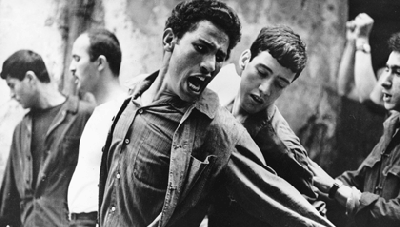
Scene from Gille Pontecorvo’s The Battle of Algiers
Another source familiar with Jihad says it’s about “an Al Qaeda terrorist living in San Diego [and] he’s smuggling a nuclear weapon into the U.S. and planning to blow up New York…it’s a very hard-hitting, very edgy, very political thriller.”
The odd thing is that Stone pretended to be ignorant about this project when I raised my hand and asked about it during a public interview he did with director Rod Lurie at the Los Angeles County Museum of Art last January (or so I recall — it may have been February).
I didn’t know about Leone’s script at the time, but I had heard Stone riff about the Algiers-like thing at the New York discussion and thought it sounded like a cool premise. And Stone said he didn’t remember anything about it and Lurie moved on to the next questioner.
Aristopundits
I asked a bunch of journalist, studio exec, producer and screenwriter pals what kind of interest they sense is out there for a run of 9/11 movies, and whether reliving a real-life nightmare in movie-ish terms is any kind of desirable. And they said…
“Frankly the best 9/11 film to date is The Barbarian Invasions. Why? Because it contained an actual shot from 9/11 — a low-angle, surprisingly close piece of video footage of one of the planes ramming right into one of the towers, quite different from the ones we’re most familiar with.
“The simple fact of the matter is no motion picture recreation can beat 9/11 itself. It’s like preferring ‘Beatlemania’ to the Beatles. Why pay for a recreation after you’ve seen the real thing?
“Of course there’s the option of making Costa-Gavras style drama about the connections between the Bush and Bin Ladin families, but I doubt anyone is interested in that.” — David Ehrenstein, Los Angeles film critic and essayist (L.A. Weekly, et. al.).
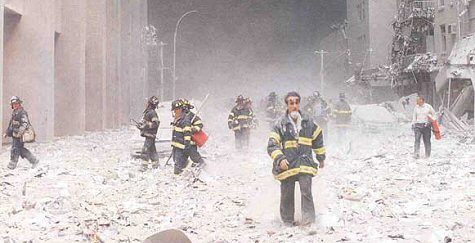
“I would say that five years seems to be the threshold for portraying a national tragedy on film. Look to The Deer Hunter, I suppose, or the Manson TV film. The tragedy has to become history in order for it to be exploited. I would say that audiences will allow filmmakers to exploit history, but not tragedy.” — A name-level director-screenwriter who asked for anonymity.
“People don’t want to be toyed with. They don’t want [this tragedy] to be exploited. They don’t want to see Leonardo DiCaprio hanging off the edge of the North Tower.” — Jim Dwyer, New York Times reporter and co-author of 102 Minutes.
“People will pay to see a movie they want to see, regardless of 9/11. Convince them in ads that it is a good movie and you will open. Fail to rise above the `gimmick’ in a way that can be made clear in marketing and people will buy tickets for Fantastic Four II instead. No one NEEDS a 9/11 movie. And any drama in theaters is fortunate to hit the $60 million mark, which has been unfairly held up as a [measure of] failure for Cinderella Man.” — David Poland, Movie City News.
“I think it’ll be like any of the showdowns where people try to produce nearly-identical pictures. Hype will win. The film that has the best hype — looks the best, that has the best pedigree, is sold most confidently by its respective studio — will win. It might coincide with quality and it might not. That’s not really the point.
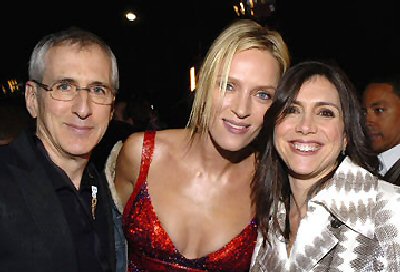
Producers Michael Shamberg (l.) and Stacy Sher (r.), the duo behind the Oliver Stone buried-under-rubble 9/11 film, flanking Uma Thurman.
“I’m willing to bet that Greengrass and Stone will make very good pictures based on what we know already. Greengrass has proven that he has an eye for this type of material with Bloody Sunday. Shooting that sort of emotionally volatile drama on that airplane… how can that not play well to an audience? He wants to improv, he wants to use a handheld camera… this one sounds like a heck of a movie, no matter what the subject.
“And I think Americans are going to have a powerful emotional response to this in theaters if Greengrass pulls it off. When the Americans rise up and stop the terrorists, you’re going to see people applaud in theaters and yell and get involved.
“Stone’s not making a political picture if he sticks to the script he’s got right now. He’s making a film about ‘the unappreciated heroes,’ which is the exact right move for him to make to help re-establish himself. If he made a kooky conspiracy picture about 9/11, I think the audience would never forgive him. Not yet, anyway.
“It’s way too soon to try and get people angry. Right now, it’s about showing us the faces of the heroes of these tragedies. It’s about trying to make us feel better about the people who were involved.
“I think there’s the chance that audiences will reject the films outright… but I doubt it. If the hype is right, they’ll be there. And that’s what will win this race, and I’m betting on Universal [in this context]. I think they’re better at opening their `big’ pictures that Paramount is, although with things so up in the air at Paramount, it’s hard to tell exactly who will be in charge of selling this one right now.

“It all depends on what they’ve got. If they’ve got a genuinely great angle on the tragedy, something unique and human that they can sell as a visceral event, then I’d say keep going. If it’s just another 9/11 movie, then they need to consider the competition
carefully.” — Drew McWeeny, Aint It Cool News.
“Frankly, I don’t think this is an answerable question. The marketplace decides how much is too much – all else is personal opinion. William Petersen thinks three CSIs is too many but CBS feels otherwise…and so does the viewing public.
“Go back to 1988: Vice Versa bombed, Like Father, Like Son bombed, and then Big opened and became a monster hit. Obviously, #3 wasn’t harmed by the stench of the first two.
“And Deep Impact didn’t hurt Armageddon six weeks later. And the constant stream of lame-brain Ben Stiller comedies hasn’t reached burn-out yet. And so on and so on.
“Thus, each 9/11 film will be judged on its own merits and attended accordingly. If we could predict the future, we wouldn’t be here — we’d be at Hollywood Park. — Major Studio Exec who asked to be nameless.
“I think it is fucking brave to be making these 9/11 movies. And it’s all quality producers making them, which is maybe why they are the top producing guns. Who knows if these movies will do business, but that’s not really the (artistic) point. Remember when no one would make Vietnam movies? Then we got Go Tell the Spartans, Platoon, Deer Hunter and I’m sure others I’m forgetting about that were excellent and provocative.

“Good luck to all of them. I’m proud to know Tim, Eric, Michael and Stacey, and I wish them well. I may not go to the movies as I am still resistant to those images, but I’m sure time will change that.” — Jonathan Dana, producer.
“I’d be very concerned if I had the third of any movie type, be it 9/11 or `a girl and her horse’ or flight thrillers or whatever. I probably wouldn’t make the third movie about this subject, though they all sound cool in their own way.
“Personally, as someone who lost a friend in the WTC, I don’t especially want to spend two hours reliving something that is still more vivid than any movie I’ve ever seen. My guess is the general public is in no rush to see this stuff on screen either. I understand the race between studios in town, but in the big picture (aka ,middle America) I’m not sure the public is clamoring for this stuff at all.
“Also, any 9/11 movie that even has a whiff of liberal bias is going to be torn apart by watchdogs on the right well before it hits theaters. I see a lot of risk in this new subgenre, just on concept alone. Keep in mind [that] most folks go to the movies nowadays to get away from the heavy shit in life. Getting them to shell out $10 bucks to relive the heaviest shit in any of our lifetimes will be tough, in my opinion.” — Another Studio Exec who asked to be nameless.
“As far as I’m concerned, a little goes a long way. To the degree that the unfortunate events of 9/11 have already been exploited to death by the Bush administration, and demeaned beyond belief by print and TV coverage, I don’t look forward to another onslaught.” — Peter Biskind, author, “Easy Riders, Raging Bulls,” “Down and Dirty.”
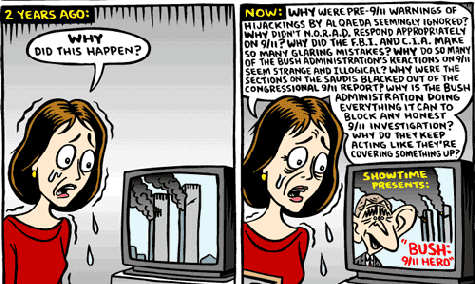
“Hollywood and indie filmmakers were doing Vietnam movies even when they weren’t overtly or specifically about Vietnam — even when they thought they were avoiding Vietnam, they were somehow acknowledging its effects.
“So far, the most imaginative post-9/11 movies made at the Hollywood level are War Of The Worlds, The Terminal, David Mamet’s Spartan and Zack Snyder’s remake of Dawn of the Dead. None of which is officially ‘about’ 9/11 in any explicit, one-to-one way.
“Which isn’t to say there can’t be any good movies dealing directly and realistically with 9/11, just that sometimes an oblique approach frees a filmmaker’s imagination, freeing him/her to deal with the world in a rawer, more instinctive way, without fear of giving offense.” — Matt Zoller Seitz, critic, New York Press.
Grabs
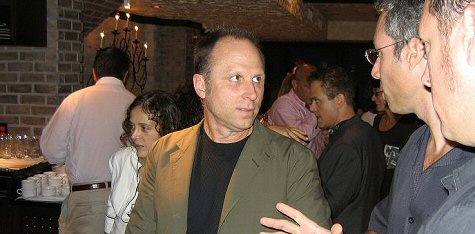
Picturehouse chief Bob Berney schmoozing it up at a journalist breakfast held at Abbacatto on Tuesday, 8.16. Journalist Sheri Roman is to the left; New York Post critic Lou Lumenick is the guy in the rear with his back turned. (He quickly turned and went over to the serving table for more French toast when he saw me get my camera out.) Berney said that Picturehouse’s The Notorious Bettie Page, directed by Mary Harron and starring Gretchen Mol, will play Toronto
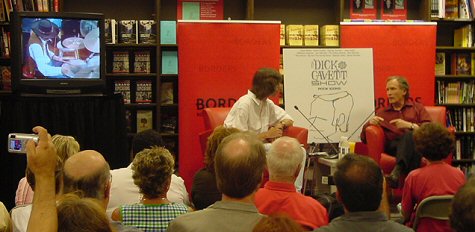
Dick Cavett (r.) being interviewed during appearance at Borders Books at Warner Center on Tuesday evening, 8.16, 6:35 pm, to sign copies of new Shout! Factory DVD “The Dick Cavett Show: Rock Icons.
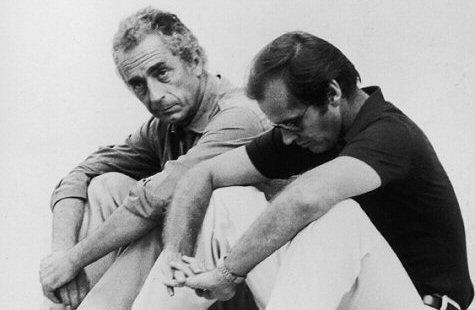
Michelangelo Antonioni, Jack Nicholson during filming of The Passenger, the 1975 semi-classic that Sony Classics is bringing into theatres prior to a DVD release.

Union Square subway underground, R line downtown — Monday, 8.15, 11:20 pm.
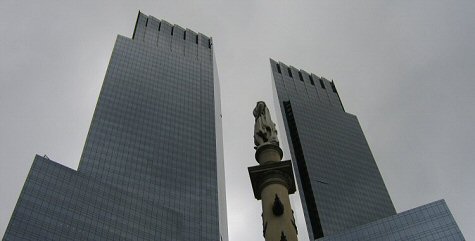
Twin towers of the Time Warner center at Columbus Circle.

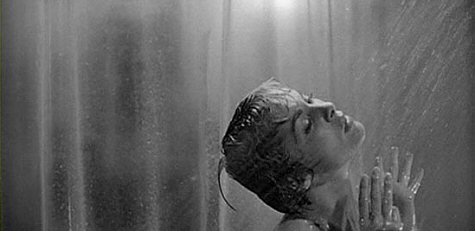
There’s always been something really penetrating about this shot, and I’m not just double-entendre-ing. I’m talking about the damp silvery beauty of the tones in this shot…about the indistinct ghostliness of the guy behind the shower curtain and how Janet Leigh seems so vulnerable and yet so exquisite and glistening and shagadelic.
